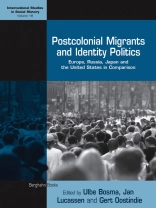These transfers of sovereignty resulted in extensive, unforeseen movements of citizens and subjects to their former countries. The phenomenon of postcolonial migration affected not only European nations, but also the United States, Japan and post-Soviet Russia. The political and societal reactions to the unexpected and often unwelcome migrants was significant to postcolonial migrants’ identity politics and how these influenced metropolitan debates about citizenship, national identity and colonial history. The contributors explore the historical background and contemporary significance of these migrations and discuss the ethnic and class composition and the patterns of integration of the migrant population.
विषयसूची
List of Figures and Tables
List of Abbreviations
Introduction: Postcolonial migrations and identity politics: Towards a comparative perspective
Ulbe Bosma, Jan Lucassen and Gert Oostindie
Chapter 1. Postcolonial Immigrants in France and their Descendants: the Meanings of France’s ‘Postcolonial Moment’
James Cohen
Chapter 2. Postcolonial Migrants in Britain: From Unwelcome Guests to Partial and Segmented Assimilation
Shinder Thandi
Chapter 3. Postcolonial Migrants in the Netherlands: Identity Politics versus the Fragmentation of Community
Gert Oostindie
Chapter 4. Postcolonial Portugal: between Scylla and Charybdis
Margarida Marques
Chapter 5. Return of the Natives? Children of Empire in Postimperial Japan
Nicole Leah Cohen
Chapter 6. Postcolonial Immigration and Identity Formation In Europe Since 1945: The Russian Variant
Allison Blakely
Chapter 7. The Puerto Rican Diaspora to the United States: A Postcolonial Migration
Jorge Duany
Bibliography
Notes on the Contributors
Index
लेखक के बारे में
Gert Oostindie is Director of the KITLV/Royal Netherlands Institute of Southeast Asian and Caribbean Studies in Leiden and Professor of Caribbean History at Leiden University.












